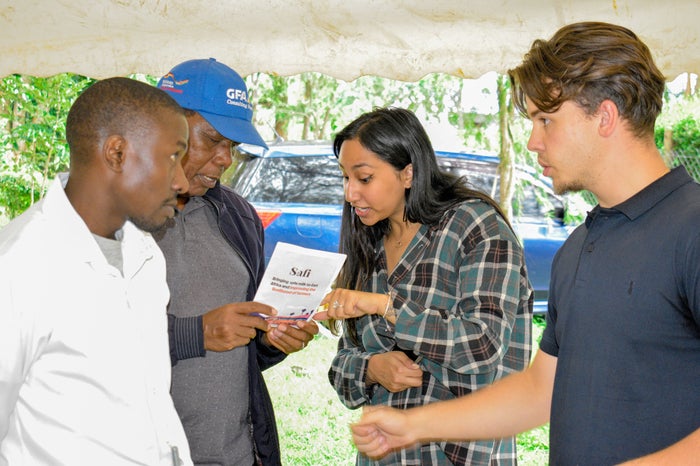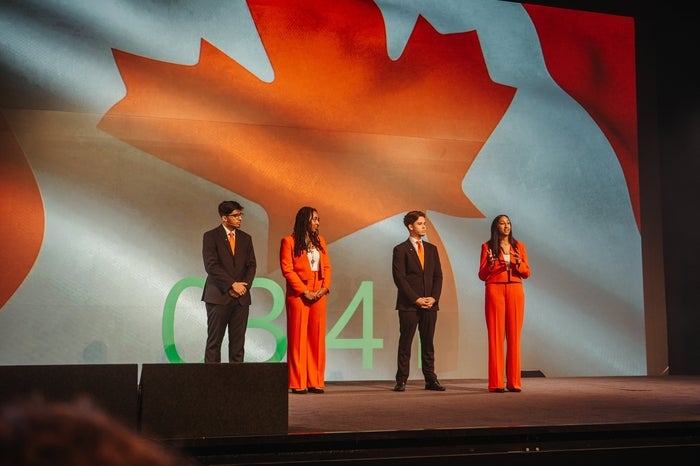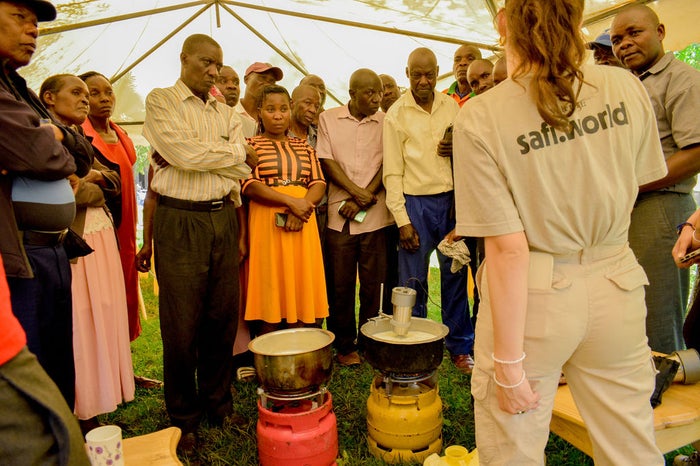For milk pasteurization start-up Safi, 2023 was a year of making their dreams a reality.
In May, the Math Innovation office helped sponsor Safi’s three computer science/business student founders – Miraal Kabir, Daria Margarit, and Martin Turuta – to travel to Rwanda and pitch their hand-held milk pasteurization device to local dairy farmers. Safi aims to make milk pasteurization cheap and accessible, dramatically reducing the transmission of milk-borne diseases.
The May trip was a resounding success, but there were still major challenges ahead.

Miraal Kabir (center) and Martin Turuta (right) explain their product to local dairy farmers.
Asking for help
The team spent their entire summer testing and refining their milk pasteurization device. They were on campus almost every day, using the Engineering Machine Shop and the Velocity Digital and Science spaces to finetune components and detect possible design flaws. In the process, they also encountered a major disappointment: they would not be able to manufacture the devices in Rwanda as originally planned.
“I think we were naïve at the beginning about how incredibly complicated and hard this was going to be,” Margarit says.
The process was particularly challenging because none of them had an Engineering background. “I was really optimistic about what we could do by ourselves,” Turuta says. “But the more we asked for help, the more experts and professionals helped us. A huge example is Graeme Adair at the Machine shop. We spent three months trying to build our product on our own, then we talked to him and within a week or two we had something ready for production.”
This “humbling” process paid off. By the end of the summer, they had a product they were comfortable bringing with them when they returned to Africa – and something they were excited to enter in that August’s American Society of Mechanical Engineers Innovation Showcase.
The importance of validation
The competition, which focuses on engineering for social good, had over 2,000 applicants from both university and professional spaces. Safi was chosen as one of the top three winners, receiving $10,000 of funding that was imperative in financing their return to Africa. More importantly, however, the win was validation after an often-gruelling summer.
“It was very validating for us that, outside of the university system, and in an engineering competition, we were still seen as good,” Miraal says. “The judges really liked how we worked as a team, and they saw us continuing to learn and grow as we work to make a difference.”

Members of Safi competed as part of the Canadian team at the Enactus World Cup.
The team members also placed in the top three at the Enactus World Cup in October, and won the GreenHouse pitch competition back at the University of Waterloo. “This project has been going for more than two years,” Turuta reflects, “but this is the first year we’ve gotten this huge push. To do all that and present it and have it recognized too has been incredible.”
“The amazing success of the Safi co-founders demonstrates that a Math education can form the foundation for other real-world impacts beyond traditional areas like high-tech and finance,” says Charles Clarke, Associate Dean for Innovation and Entrepreneurship in the Faculty of Mathematics.
Returning to Africa
The most important part of Safi’s year was when they returned to Africa in September. They first traveled the African Dairy Conference and Exhibition in Uganda, where they were invited to meet with the Ugandan Minister of Agriculture. In Rwanda, they set up pilot testing with four milk kiosks in Kigali.
Finally, they traveled to Kenya, where they were able to partner with the NGO Core Health and Wealth and run workshops on pasteurization for local farmers. In Kenya, they also attracted the attention of pharmaceutical company Boehringer-Ingelheim, who invited them last minute on a whirlwind trip back to their German headquarters for their annual social entrepreneurship conference.

Daria Margarit leads a workshop with dairy farmers
"The Faculty of Mathematics is so proud of Safi and the positive impact of their innovation in such a short time frame,” says Stephanie Whitney, Director for Research & Innovation Partnerships in the Faculty of Mathematics. "We’re so pleased that our small contribution to their work has helped lead the to such amazing things. We’re excited to continue to support them in what they accomplish next.”
Now, finally back in Canada, the Safi founders are looking forward to the future. While they’ve seen incredible success, they still have far to go: their company currently has $0 in net revenue, and they have another April pilot planned to validate their supply chain and business model before they can begin large-scale production. They also have a deadline in mind: their graduation in August, after which they all hope to work on Safi full-time.
“We’ve learned so much this year,” Kabir says, “about being willing to ask for money, and ask for expertise, and deal with setbacks. I recently looked at our original plan from when we started in early 2021, and it was wild,” she laughs. “We thought we would be fully running by December 2021, distributing to half of Africa, a billion-dollar company.”
“I think that optimism was so important, though,” Margarit adds. “If we had focused on possible criticisms and ways we could fail, we would have gotten overwhelmed. I think that intense belief that we could make a positive impact is why we’ve made it this far.”